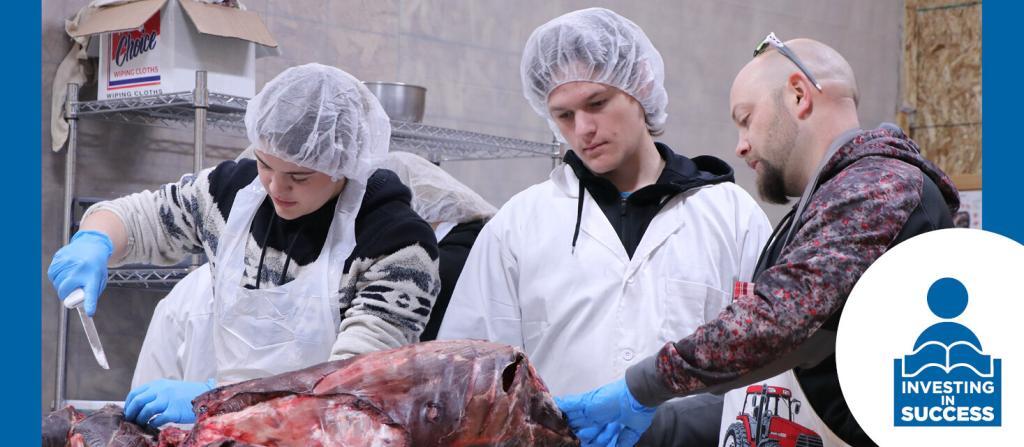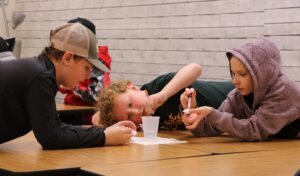
Craig Puckett wanted to be a butcher when he was in high school. He told one of his favorite teachers, and his school launched a class that includes hands-on processing of livestock and game.
Three years later, with the help of Student Success Act money, the animal science class is one of North Lake School District’s most popular programs. Students and parents say it shows school leaders understand their rural community.
The 2019 act created the Student Investment Account, sending $892 million to Oregon districts for 2021-23. The act’s funding is starting to show up in classrooms, giving education leaders a chance to tailor programs to their areas. OREdNews is offering an occasional series, “Investing in Success,” to look at districts’ investments.
North Lake serves about 220 students from three unincorporated communities southeast of Bend: Fort Rock, Christmas Valley and Silver Lake. The K-12 school, roughly equidistant to the three towns, sits on a hill among farms and rangeland. The district received $560,000 for the 2021-23 biennium, money used to add four positions this school year that expanded student opportunities.
Board Chair Scott Duffner said rural areas with few services are used to leaning on their neighbors or church, but there are some things they just can’t do. The SIA investments help connect the school to the community by responding to local needs, he said.
Superintendent Gail Buermann said the SIA’s highest impact went to creating student mental health supports that simply didn’t exist before. Private health care providers, therapists and nonprofit agencies are all more than an hour’s drive away, and a local county health center is already heavily burdened. North Lake added a full-time behavior specialist position and hired a counselor who visits roughly six days a month.
Behavior specialist Holly Vore operates out of the new “Ms. Holly’s Balance Room.” The space’s soft lighting, comfortable seating and pleasantly painted walls offer a respite for students who need to talk or just a quiet place to work. Vore estimates 10-15 students a day drop by.
Vore handles the low-level day-to-day anxieties. She alerts the administration and counselor about students who need more help. She also shows students and teachers how to regulate emotional health and build relationships.
School counselor Rosana Cahill drives nearly two hours one way to teach character classes to grades K-6 and help with cases beyond Vore’s expertise. She does individual and small group counseling.
Principal Cameron Mitchem said he has seen student behavior improve this year and his job would be a lot harder if the district had to cut the positions.
Buermann said the district would have difficulty continuing the positions without the SIA funding.
“I don’t know what I would do if I lost that money,” Buermann said. “You have to give the kids all the help they need.”
The Student Investment Account also allowed the district to add a technology specialist.
Nick Thompson’s office has computer parts stacked on every available surface. Without a computer repair shop within miles, he cannibalizes components from broken computers to keep students’ devices working. He helps maintain the district’s cybersecurity as well as teaching students about digital safety. He also performs odd technology jobs that would require an expensive visit from a distant serviceperson, such as wiring a new digital school sign or setting up automatic sprinklers.
The High School Success Fund, also known as Measure 98, paid the start-up costs for the butchering class. The Student Investment Account money, though, increased the class’s impact with the hiring of Hannah McAuliffe as an ag science teacher. She co-teaches the butchering class with Chad Waldron, the ag science teacher who started it.
Administrators say McAuliffe has brought more students, especially young women, into ag-related classes and activities. The FFA program increased this year to roughly 80% of the high school students, according to Waldron.

Among McAuliffe’s duties, she teaches plant and animal science to K-6 classes. She invites older students to help teach, further expanding student opportunities.
Sophomores Tayva Forman and Molly Kenagy recently spent part of a day teaching elementary students a lesson they designed about seeds. Forman wants to be a teacher, and she said working with McAuliffe makes it feel possible.
The butchering class, with around 10 students a period, has a waitlist. Incorporated into an animal sciences curriculum, the class processes about two animals a month, mostly community donations.
On a recent morning, four students were cutting up an antelope donated by a rancher who found it tangled in his fence. The animal had been skinned, and the students were working various cuts from the quarters. Some of the meat will go to families in need and some will be used for a staff barbecue next month.
Puckett, as he often does, was helping the class. Puckett, having graduated, started his own part-time mobile meat processing business. The communities don’t have a local butcher. Puckett wants to start a U.S. Department of Agriculture-certified butcher shop on family property.
“It’s hard to find meat at reasonable prices around here,” he said.
Junior Michael Shumway wants to work for Puckett. Shumway plans to study psychology in college, but he figures butchering would make good part-time work in the meantime.
Dani Bates, a senior, thought she might want to be a butcher because her parents own the Cowboy Dinner Tree restaurant. After taking the class, she decided to study criminology instead but wants to keep butchering as a fallback option.
Waldron said the class lets students explore a possible career. It also gives them practical knowledge for picking out meat at the store or when processing their own game or farm animals.
Community member Daniel Miles voted in 2016 against Measure 98. He’s also not a fan of the corporate activities tax that funds the Student Investment Account. But as chair of the local Ag Advisory Board that helps oversee how that money is used, he said he sees it differently now.
“These funds are making a difference,” he said.
– Jake Arnold, OSBA
jarnold@osba.org